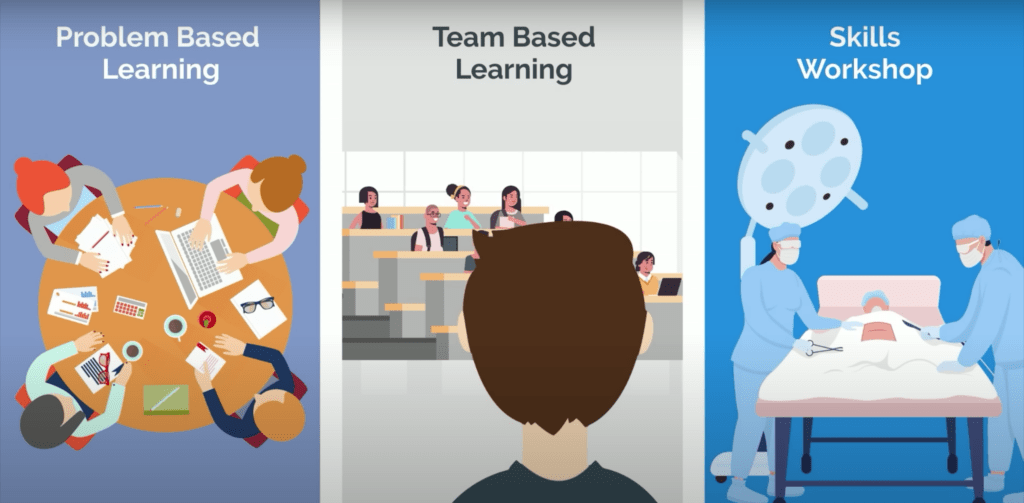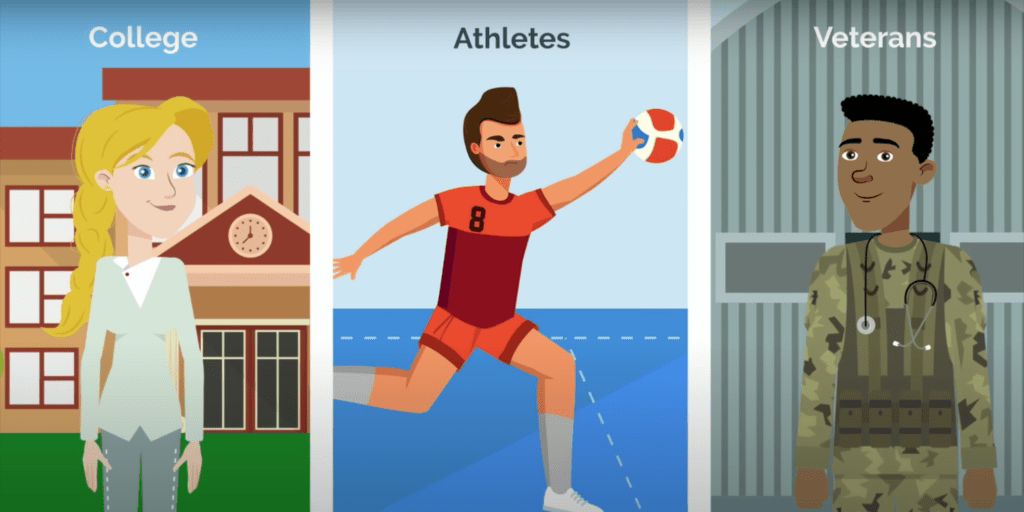You’ve heard it all—medical school makes it impossible to have a life, it’s like drinking from a fire hydrant, and you’ll only ever find happiness at the end of the tunnel. But what if I told you much of what you’ve heard about medical school is completely wrong?
You Can Have a Life in Medical School
The stereotype of medical school is that you won’t have much of a life beyond studying and burying your nose in textbooks or notes. You might be surprised to hear it’s possible to have more of a life than you think for two main reasons.
First, while there is certainly more volume of content to go through than in college, you’ll have fewer demands on your time outside of the classroom. As a competitive premed, you might have been juggling research with volunteering with clinical experience with leadership experience and so on and so forth.
In medical school, your top priority is focusing on learning the information and skills required to be a competent physician. In other words, for most medical students the long list of extracurriculars becomes heavily truncated. Depending on your intended specialty, research will likely be your second professional priority outside of your studies, but there is far less focus on volunteering, clinical experience, and others.
Second, it depends on what specialty you’re pursuing. This is good news if you’re pursuing a more attainable specialty and bad news if you’re pursuing a more competitive specialty.
My friends pursuing more attainable specialties were able to lead a more balanced life, spending additional time outside of academic pursuits, not worrying about having the highest number of publications or setting the curve on block exams. My friends pursuing the most competitive specialties spent more time studying, more time doing research, and some also pursued additional leadership opportunities.
To find out where your desired specialty stacks up, check out our guides on the most competitive specialties and the least competitive specialties.
1 | Everyone Needs Stress-Management
Medical school is going to be stressful, no matter how zen you may be before orientation. Because medical school demands so much of you, you’ll be operating at near full capacity for extended periods of time. Therefore, any hiccup or speed bump in life that would otherwise be manageable can feel disastrous, and stress levels spike through the roof.
The secret isn’t powering through and denying your emotions. Instead, you need to figure out what techniques best serve you when tensions rise. Maybe it’s exercise, meditation, confiding in loved ones, journaling, a hobby, or any combination of these.

Learn more from our articles on how to exercise with a busy schedule, the power of meditation and mindfulness, and the benefits of journaling.
Failure to invest time in stress mitigation techniques can be disastrous for your mental health and longevity. A colleague of mine began experiencing stress-induced headaches under the pressure of studying for the MCAT in college before his junior year. After the gauntlet of MCAT studying, his headaches subsided during junior and senior years under the reduced workload. However, the issue resurfaced at a higher intensity under the rigors of medical school, and he ultimately dropped out well before earning his MD.
2 | Difficulty vs. Volume
Next, premeds often mistake medical school’s difficulty with its volume. Make no mistake—medical school is certainly challenging, but it’s not because of the conceptual difficulty of the material. Rather, it’s a consequence of the volume.
There are a few exceptions that many students find challenging, including cardio and pulmonary blocks, which rely on more mathematical equations and fluid dynamics than other organ systems.
Depending on your major in college, you may actually find the content in medical school to be easier from a conceptual difficulty and understanding perspective. Those who pursued engineering, math, physics, neuroscience, and other critical-thinking heavy majors will find the content of medical school far easier to wrap their heads around.
Where just about everyone will be surprised is the pace of learning. You’ll be expected to learn a large volume of information incredibly fast. It’s not uncommon to feel perpetually behind, but it becomes far more manageable once you accept the messiness of effective studying and embrace active learning techniques.
3 | Your Study Techniques Suck
Which brings me to the next point—your study strategies are likely dog excrement. This fact is harder for the valedictorians and straight-A students to accept than the students who struggled.
High school and college are comparatively far more forgiving of subpar study strategies than medical school. Many students who achieve a straight 4.0 GPA in college and set the curves feel assured that they’ll be fine in medical school. Unless they’ve been following our study strategy advice, which we recommend even in high school and college, they’re usually in for a rude awakening.
Passive techniques such as re-reading notes, or even worse, re-listening to lectures, are woefully inadequate to perform well in medical school. Optimal learning isn’t about just repetition, as many assume. Rather, it requires creating new neuronal connections and strengthening them. This occurs most effectively through recalling information, rather than recognizing it, and by interacting with the information in multiple novel ways, not just one.
Unfortunately, most students don’t employ active learning techniques because they are initially messy and uncomfortable. Passive techniques, on the other hand, are easy and familiar. The problem is that passive techniques are far less effective if you’re interested in learning the most amount of information in the least amount of time and getting back to living your life.
Learn more: 7 Evidence-Based Study Strategies (And How to Use Each)
4 | Self-Directed Learning
In college, you’re often juggling multiple assignments across your classes throughout the semester, in addition to quizzes and midterms before your finals. These serve as frequent check-ins, keeping you on track with your studying and warding off excessive procrastination, for the most part.
Medical school has fewer assignments and fewer quizzes, thus requiring more self-directed learning to keep on track. Depending on your medical school, exams will likely be less frequent than in college, and each test will hold greater weight on your final grade. Without honing your discipline and avoiding the temptation of procrastination, you’ll be in for a bumpy ride.
This becomes even more extreme during the clinical years when you’re more isolated from your classmates and generally have only one shelf exam at the end of a 4-12 week rotation.
5 | Everyone Knows Everyone’s 💩
Medical school is a far more intimate affair than college. Rather than thousands of students per entering class, there are only a couple hundred, if that. Most medical school classes range between 100-200 students. Even the largest classes are only a bit over 1,000, whereas college classes may be an order of magnitude larger.
While you can disappear in the crowds of college, you can’t do the same in medical school. You’ll know every classmate by name, and vice versa. Unless you attended a smaller liberal arts college, you’ll be surprised that there aren’t several hundreds of students in lecture hall, but rather a fraction of that. There will be more small group sessions, such as problem based learning, or PBL, and other intimate group learning settings.

Protect your reputation. It’s slow to earn but fast to tarnish, and in the smaller intimate setting of medical school, there is no hiding. Drama spreads like wildfire, and the last thing you want to do is solidify a questionable reputation, especially early on in medical school, as it’s near impossible to shake.
6 | Diversity in Classmates
While your college might have felt like a melting pot, you’ll be amazed at the level of diversity in medical school. The overwhelming majority of college students arrived straight from high school, but your classmates in medical school will be from all walks of life. The average age of entering students is usually in the mid-20’s, depending on the program, but it’s not uncommon for some students to be well in their 30’s and beyond.
Many will have come straight from college, but some will be transitioning from other careers, be accomplished athletes, or even have served in the military overseas. You’ll be humbled by the exceptional individuals you’ll have the honor of calling your colleagues.

Medical school is an adjustment for everyone, but don’t forget these underappreciated realities. If you find yourself struggling with your academic performance, study strategies, research output, or other aspects of medical school, remember that we’re here for you.
We know exactly what you’re going through because we’ve been there. Many of us, myself included, are the sons and daughters of immigrant parents and the first to pursue medicine, let alone a career in healthcare. But just because the odds are stacked against you doesn’t mean you can’t exceed expectations and become a top performer.
We’ll even show you how we got multiple top 10 medical school acceptances, got our entire medical school costs covered through merit-based scholarship, matched into the most competitive specialties for residency, and how you can do the same. Learn more at MedSchoolInsiders.com.
Thank you all so much for watching. If you enjoyed this video check out Why Getting into Medical School is So Hard (& How to Stand Out).









